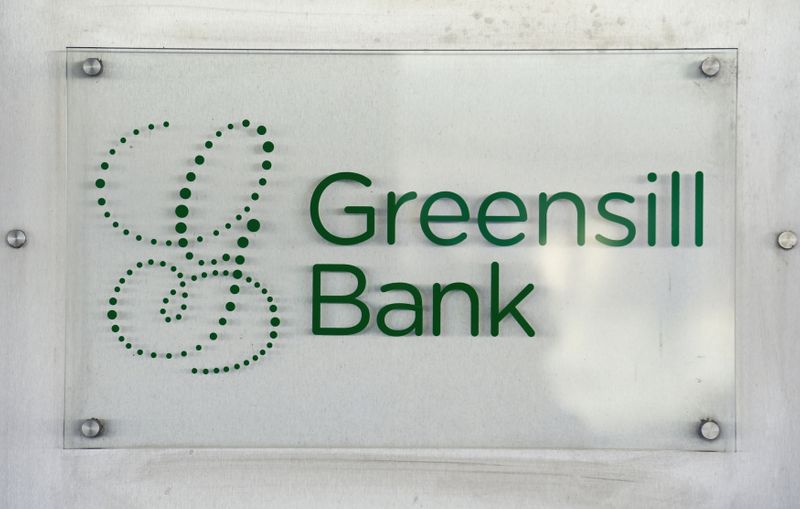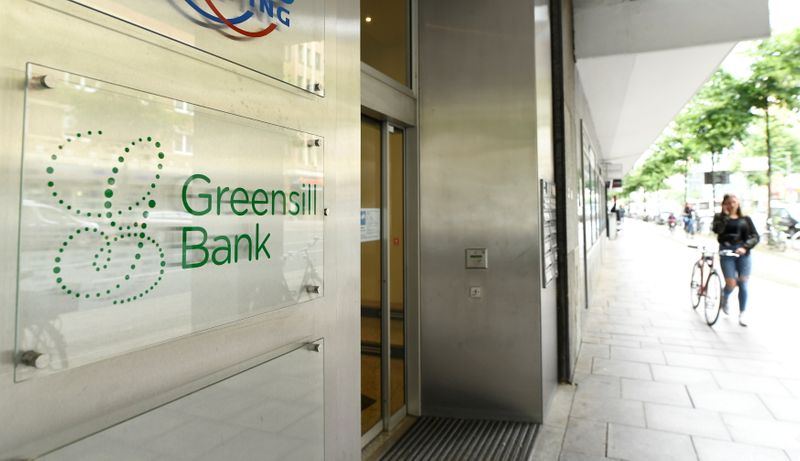By Tom Bergin
LONDON (Reuters) - A funding crisis at Greensill Capital could spill over to some of its high-risk borrowers and lead to losses for insurers and banks that have done business with the UK-based supply chain finance firm if its clients default, according to several industry experts and a review of public filings.
Greensill, backed by Softbank (OTC:SFTBY) Group Corp's Vision Fund, helps companies spread out the time they have to pay their bills. The loans, which typically have maturities of up to 90 days, are securitized and sold to investors, allowing Greensill to make new loans.
Earlier this week, Greensill's primary source of funding came to an abrupt halt. Swiss bank Credit Suisse (SIX:CSGN) Group AG and asset manager GAM Holdings AG suspended redemptions from funds that held most of their around $10 billion in assets in Greensill notes over concerns about being able to accurately value them.
Greensill is preparing to file for bankruptcy and is also in talks to sell large parts of its business to private equity firm Apollo Global Management (NYSE:APO) Inc, a source close to Greensill said on Wednesday. But Apollo is not planning to bail out Greensill's borrowers and does not even want to provide loan arrangement services to Greensill's riskier clients, two sources close to the talks said, because of the financial and reputational risks.
While Greensill did not name Apollo, it confirmed on Tuesday it was in talks with "a leading global financial institution" to buy its business. Apollo, Softbank and Credit Suisse declined to comment.
The uncertainty about what happens over the next few days could ripple through Greensill's clients and other financial institutions.
For the company's clients, an inability of Greensill to continue funding them may mean having to repay debts soon and finding alternative sources of financing in the near term, according to four experts in short term, inventory-backed - or 'supply chain' - financing of the type Greensill offers.
That could be especially problematic for its higher-risk clients, which may struggle to raise funds elsewhere or have to pay much more for the financing.
"If you have just a single source for this kind of capital, you may have to scramble around," said Craig Jeffrey, of consultancy Strategic Treasurer, near Atlanta, which advises clients on supply chain finance.
Any inability of borrowers to pay could, in turn, lead to losses for credit insurers that have sold protection against defaults on Greensill securities bought by the Credit Suisse funds. And if those insurers don't pay up, investors could sue Credit Suisse to cover their losses, said Thorsten Beck, finance professor at the University of London. Analysts at Morgan Stanley (NYSE:MS) said in a research note this week that even if the Swiss bank doesn't face direct financial losses, it would face reputational damage from the crisis.
In addition, a bank owned by Greensill in Germany, which keeps the company's short-term loans on its balance sheet before they are securitized and sold to Credit Suisse, could also be on the hook for losses if the sudden withdrawal of credit prompts any defaults on debts it was temporarily holding, according to ratings reports and published accounts.
On Wednesday, Germany's financial regulator Bafin filed a criminal complaint against Bremen-based Greensill Bank saying the lender could not provide evidence of receivables it said it had purchased from metals-to-finance group GFG Alliance.
In a statement to Reuters, Greensill Capital spokesman James Doran said talks were ongoing with a suitor on a deal for parts of its business which could help preserve operations and jobs. "While the structure of the new business is still being determined, we expect the transaction will ensure the majority of Greensill clients will continue to be funded in the same way as they currently are while also preserving a substantial number of jobs."
Greensill Bank always "seeks external legal and audit advice before booking any new asset," Greensill Capital added. It declined to comment on the specific Bafin allegation. GFG did not respond to requests for comment about Greensill Bank.
SUPPLY CHAIN MODEL
The supply chain lending model is usually seen as a relatively low-risk investment. But Greensill, formed in 2011 by former Citigroup (NYSE:C) banker Lex Greensill, has taken on some highly indebted customers, publicly available accounts for borrowers show. It has also lent money to fund fixed assets like buildings and factories, which are more typically funded via longer-term financing, the accounts show, whereas supply chain financing usually covers short-term debts like paying for inventory.
One of its largest customers is GFG, run by Indian-British metals tycoon Sanjeev Gupta. GFG Alliance had to pay a 12% interest rate when it issued debt on public markets in 2019.
But Greensill said his business typically provided credit to businesses for around 4%, and could do so because investors would accept low returns as he ensured debts were backed by assets which would be quickly realized.
Reuters could not learn the specific rate that Greensill charged GFG and how much of the Credit Suisse and GAM funds' assets are accounted for by GFG loans. Previous accounts for the funds and the companies involved show hundreds of millions of dollars of outstanding credit at any one time.
GFG Alliance spokesman Andrew Mitchell said the group had alternative funders to Greensill.
"GFG Alliance has adequate current funds and its plans to bring in fresh capital through refinancing are progressing well," he said, adding the troubled companies GFG bought were being turned around and were generating positive cashflow.
GERMAN EXPOSURE
Any customer defaults could also impact Greensill Bank in Bremen, Germany, a review of ratings reports and published accounts shows. The bank's exposure to GFG is unclear but its most recent capital requirements disclosures show that in 2019, it took on over $1 billion in exposures in Macedonia, the Czech Republic and Romania, after GFG began doing business in these countries.
Greensill Bank is largely funded by around 3 billion euros of deposits and depositors are protected by the bank's membership of the deposit protection fund of the Federal Association of German Banks.
Greensill Bank declined to answer questions about its finances and neither it or Credit Suisse disclose its exposure to individual companies.
Any losses to the Credit Suisse funds could also flow to multiple parties. Credit insurers have sold the Credit Suisse funds and Greensill protection against defaults on Greensill securities bought by the funds. While Greensill Capital is responsible for first losses on the funds to the tune of $1 billion, accounts show, insurers cover much of the rest, Credit Suisse said in January.
Credit Suisse declined to confirm whether the debts currently in the fund are covered by insurance and who covered them.
Credit Suisse, too, is a creditor to Greensill. The Zurich-based bank has $140 million in loans outstanding to the company, a source familiar with the matter said.

Greensill declined to say if sale talks envisaged the potential buyer taking on its debts or those debts held by the Credit Suisse funds. Credit Suisse declined to comment on the debt.
